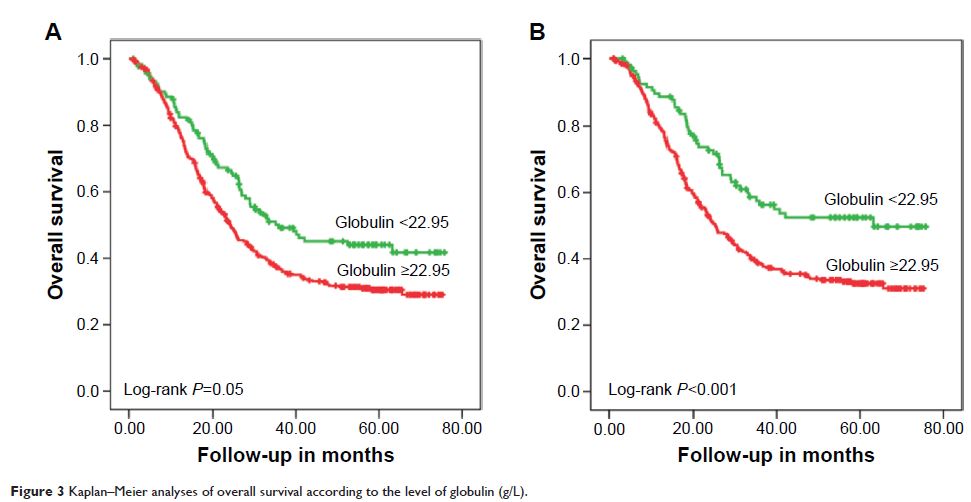109568
论文已发表
注册即可获取德孚的最新动态
IF 收录期刊
- 3.4 Breast Cancer (Dove Med Press)
- 3.2 Clin Epidemiol
- 2.6 Cancer Manag Res
- 2.9 Infect Drug Resist
- 3.7 Clin Interv Aging
- 5.1 Drug Des Dev Ther
- 3.1 Int J Chronic Obstr
- 6.6 Int J Nanomed
- 2.6 Int J Women's Health
- 2.9 Neuropsych Dis Treat
- 2.8 OncoTargets Ther
- 2.0 Patient Prefer Adher
- 2.2 Ther Clin Risk Manag
- 2.5 J Pain Res
- 3.0 Diabet Metab Synd Ob
- 3.2 Psychol Res Behav Ma
- 3.4 Nat Sci Sleep
- 1.8 Pharmgenomics Pers Med
- 2.0 Risk Manag Healthc Policy
- 4.1 J Inflamm Res
- 2.0 Int J Gen Med
- 3.4 J Hepatocell Carcinoma
- 3.0 J Asthma Allergy
- 2.2 Clin Cosmet Investig Dermatol
- 2.4 J Multidiscip Healthc

治疗前的白蛋白 - 球蛋白比例对 D2 手术切除的胃癌患者长期死亡率预测的预后价值
Authors Liu J, Chen S, Geng Q, Liu X, Kong P, Zhan Y, Xu D
Received 27 October 2015
Accepted for publication 31 March 2016
Published 13 April 2017 Volume 2017:10 Pages 2155—2162
DOI https://doi.org/10.2147/OTT.S99282
Checked for plagiarism Yes
Review by Single-blind
Peer reviewers approved by Dr Yu An
Peer reviewer comments 2
Editor who approved publication: Professor Min Li
Background: Several studies have highlighted the prognostic value of the
albumin–globulin ratio (AGR) in various kinds of cancers. Our study was
designed to assess whether AGR is associated with the prognosis of gastric
cancer patients.
Patients and methods: A total of 507 gastric cancer patients between 2005
and 2012 were included. The AGR was defined as the ratio of serum albumin to
nonalbumin and calculated by the equation: albumin/(total protein - albumin).
Furthermore, AGR was divided into two groups (low and high) using the X-tile
software. Survival analysis stratified by AGR groups was performed.
Results: The mean survival time for each group was
36.62 months (95% CI: 33.92–39.32) for the low AGR group and 48.95 months
(95% CI: 41.93–55.96, P =0.003) for the high AGR group.
Patients in the high group (AGR ≥1.93) had a significantly lower 5-year
mortality in comparison with the low group (AGR <1.93) (52.4% vs 78.5%, P =0.003). The high
AGR group showed obviously better overall survival than the low AGR group
according to Kaplan–Meier curves (P =0.003).
Multivariate analysis showed that AGR was an independent predictive factor of
prognosis in gastric patients.
Conclusion: Pretreatment AGR is a significant and independent
predictive factor of prognosis.
Keywords: gastric
cancer, survival, inflammation, albumin–globulin ratio
